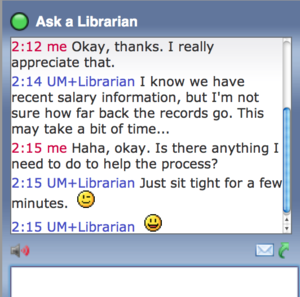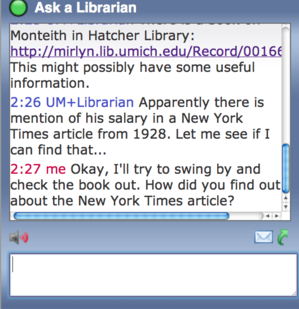How much did the first U-M president make? How 'Ask a Librarian' service helped me find out
These days everyone is adapting to the need-to-know-instantly mentality.
How to ask a U-M librarian
- Instant message.
- Text message them at 734-531-9ASK (734-531-9275).
- Call
It's so easy it feels wrong.
Well, it turns out that this same service is available through the University of Michigan library. And the crazy thing is you can ask anything —well, almost anything,— and they'll do their best to direct you to resources and answers.
I found out about this feature recently when a friend, a graduate student at U-M, could not stop discussing the novelty of it during a recent outing.
This week I decided to try it out myself.

First I had to pick just the right question. I didn't want my inquiry to be simple, but I still wanted it to be in the realm of possibility.
I settled on inquiring about the annual salary of the first-ever U-M President John Monteith, who served at the helm of the University of Michigania from its founding in 1817 through 1821.
Then I went to the Ask a Librarian website and... asked a librarian.
Not 60 seconds passed before I received a response.
"Hello, this is Erin," UM+Librarian wrote at 2:11 p.m. "This is an interesting question. Let me see if I can point you in the right direction."
At first, things looked kind of grim: "I know we have recent salary information, but I'm not sure how far back the records go. This may take a bit of time...," Erin wrote.
Okay, okay. I figured the answer might not be easy to find. But as Erin sat tucked away somewhere in a U-M library searching for an answer to my question, I started to feel guilty and a bit lazy. Shouldn't I be helping?
So I asked.
"Is there anything I need to do to help the process?" I wrote.
Erin, like a kindly hostess, told me to "just sit tight for a few minutes" and sent me not one but two emoticons.
One was winking and the other was smiling.
The effect was instant: Someone was happy to help me! I was instantly mimicking that smiling emoticon.
Eleven minutes after my initial inquiry, Erin referred me to a book in Hatcher about Monteith. Four minutes after that, Erin reported a possible New York Times article with the information I was looking for.
"Apparently there is mention of his salary in a New York Times article from 1928. Let me see if I can find that..." Erin wrote.
Hmm. Apparently? I asked Erin how she (or he?) found out about the article.
"I went to Wikipedia for some general background info on Monteith, and it listed a few references at the bottom of the entry."

Yes, you read that right. I got out-Wikipediaed by a librarian. It took Erin —who by now I had dubbed my favorite librarian in all the land— less than five minutes to nail down the article for me.
"Okay, I found the NYT article. Let me describe how you can access it," she told me at 2:32 p.m, and then proceeded to explain step-by-step how I could access the piece and exactly where the desired information could be found. "Salary is mentioned in the last few paragraphs."
Ever the diligent librarian, Erin also referred me to Bentley Historical Library and let me know I could access "all of Monteith's papers" there.
Once I received the information I had asked about, I started to feel anxious. I didn't want to end the conversation. I liked Erin and wanted to ask her (or him?) another question, but I didn't want to monopolize her (or his) time.
Still, I couldn't help myself. I wasn't quite ready to let go.
"You were so helpful, thanks! How many questions do you think you assist a day?" I asked.
Erin replied: "Glad I could help! The number of questions varies quite a bit. Usually we get lots of questions around midterms and finals."
It turns out that online chatting is available 77 hours a week and until midnight most evenings during the school year and has been since 2007.
So, are you wondering how much the first U-M president got paid?
At least $800 a year, according to that 1928 New York Times article.
Kellie Woodhouse covers higher education for AnnArbor.com. Reach her at kelliewoodhouse@annarbor.com or 734-623-4602 and follow her on twitter.


Comments
Jen
Mon, Apr 9, 2012 : 7:56 p.m.
Something tells me the commenters are missing the point of this article, which is not actually about what U-M's first president earned, nor what the current university president earned.
Dcam
Mon, Apr 9, 2012 : 8:19 p.m.
It may surprise you but a newspaper article is supposed to enlarge one's horizons, not limit them, unless, of course you like constraints. There's not much to discuss regarding a chat line with a librarian being available, and what's been written needs no gilding. However, the example of choice, on the other hand, opens up a whole realm of topics to be discussed - and the history of the UM is one of them, which meshes nicely with the example. So...no we didn't miss the point of the article, but you missed an opportunity to increase your knowledge.
Dcam
Mon, Apr 9, 2012 : 7:29 p.m.
Alkthough it's true about Michigania, ""It would be difficult, however, to recognize the present University in that curiosity of educational history established by the Act of 1817 under the sonorous title of the "Catholepistemiad, or University of Michigania." "The institution which arose in the shade of this immense growth of pseudo-classical verbiage was a very modest undertaking indeed and developed little beyond the primary school...Scarcely more ambitious was the faculty of two men, the Rev. John Monteith, a Presbyterian clergyman who was President and seven-fold didactor, and Father Gabriel Richard, a Catholic priest who was Vice-President and incumbent of the other six didaxiim." The first true president of the University of Michigan, by act of legislation: "The new University Act had charged the Regents with the duty of electing a President immediately. It was some time, however, before they found the right man, Henry Philip Tappan, LL.D., who was inaugurated as the first President of the University of Michigan on December 22, 1852." Wilfred Shaw. The University of Michigan I highly recommend the book for interested UM fans. It's informative, lots of pictures and it's free. http://www.gutenberg.org/files/21532/21532-h/21532-h.htm Resolved, That the Board of Regents recognize the right of every resident of Michigan to the enjoyment of the privileges afforded by the University, and that no rule exists in any of the University statutes for the exclusion of any person from the University who possesses the requisite literary and moral qualifications. Wilfred Shaw. The University of Michigan
Pablo
Mon, Apr 9, 2012 : 4:16 p.m.
It's been well-published re: her salary. But...can anyone tell me what the regents are paid for their services, recognizing, according to reports, that each is quite wealthy?
DBH
Mon, Apr 9, 2012 : 4:38 p.m.
According to Wikipedia (as well as my own recollection), "[t]he Regents (excepting the President) serve without compensation, and meet once a month in public session." See http://en.wikipedia.org/wiki/Board_of_Regents_of_the_University_of_Michigan .
Trouble
Mon, Apr 9, 2012 : 4:10 p.m.
Mary Sue is always smiling!
trespass
Mon, Apr 9, 2012 : 11:26 a.m.
I was curious about how much $800 was in current dollars. According to the inflation calculator it would be less than $11,000. Since President Coleman makes around $800,000 plus perks, it sounds like our current President's salary is a bit more than our first President.
DBH
Mon, Apr 9, 2012 : 12:59 p.m.
OK, @trespass, see if you can calculate a standardized salary for the two. For example, how much did/does each make per student/staff/faculty (or whatever other parameter you might choose that is reasonable). I am willing to bet the discrepancy will be lessened substantially.